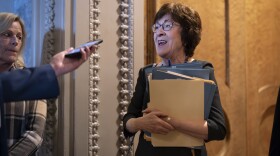-
The largely symbolic vote follows Collins' opposition in November to a resolution that would have required the president to seek congressional authorization to use military force in Venezuela. The Republican has expressed support for the U.S. operation that captured Venezuelan President Nicolas Maduro, but she says she does not back long-term military involvement.
-
The Republican's decision to sign the petition for the prospective 2026 referendum is consistent with her past statements on the issue, But it's also a departure from her typical reluctance to weigh in on state-level issues, including ballot initiatives.
-
Graham Platner is sharing more about post-combat struggles. Has it made his campaign more resilient?Deleted Reddit posts and tattoo controversies blunted the Democrat's U.S. Senate candidate's surge of early momentum. Now the oyster farmer and military veteran is talking more about his battle with PTSD and reconciling his part in "stupid foreign wars." The people showing up to his town halls are still curious, some even more devoted.
-
Nearly 50 protestors converged on the Portland offices of Republican Senator Susan Collins and Independent Angus King Monday in the wake of a tentative deal to end the government shutdown that doesn't include an extension of healthcare subsidies.
-
They say Collins bears responsibility for the court's subsequent decision to overturn Roe v. Wade.
-
Collins, a Republican, echoed her party's criticism of Democrats, who are holding out for an extension of Affordable Care Act health insurance premium tax credits.
-
Health care advocates joined U.S. Senate candidate Graham Platner today in Bangor to highlight the impacts they say the "One Big Beautiful Bill Act" passed this summer will have in Maine.
-
Nurses rallied in Portland today against the proposed Medicaid cuts in the budget bill that they say prevent thousands of Mainers from receiving the care they need.
-
Under the so-called "Big Beautiful Bill" the Energy Efficient Home Improvement Tax Credit would phase out at the end of the year. Senators passed a version of the proposal Tuesday.
-
Collins, a key vote in advancing the proposal over the weekend, was one of three GOP holdouts on Tuesday that forced Vice President JD Vance to break a tie.
Bangor Studio/Membership Department
63 Texas Ave.
Bangor, ME 04401
Lewiston Studio
1450 Lisbon St.
Lewiston, ME 04240
Portland Studio
323 Marginal Way
Portland, ME 04101
Registered 501(c)(3) EIN: 22-3171529
© 2026 Maine Public
63 Texas Ave.
Bangor, ME 04401
Lewiston Studio
1450 Lisbon St.
Lewiston, ME 04240
Portland Studio
323 Marginal Way
Portland, ME 04101
Registered 501(c)(3) EIN: 22-3171529
© 2026 Maine Public

Play Live Radio
Next Up:
0:00
0:00
Available On Air Stations
Scroll down to see all available streams.










